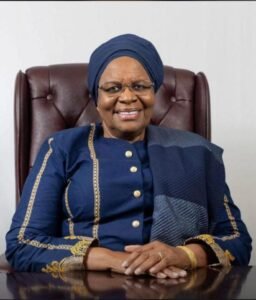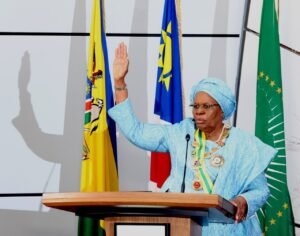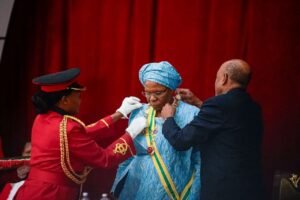On the historic occasion of Namibia’s 35th independence anniversary, Netumbo Nandi-Ndaitwah was sworn in as the country’s first female president, marking a new chapter in the nation’s political sphere.
Popularly known as “NNN”, her rise to the highest office reflects a lifelong commitment to public service and the ruling South West Africa People’s Organisation (SWAPO), which has governed Namibia since its independence from South Africa in 1990.
At 72 years old, Nandi-Ndaitwah assumes the presidency following her 58% victory in the November 2024 elections. She succeeds Nangolo Mbumba, who assumed office in February 2024 after the death of his predecessor, Hage Geingob, at the age of 82.
Leading a nation where over 70% of the population is under 34, according to the 2023 census, Nandi-Ndaitwah’s presidency signals a generational shift while maintaining SWAPO’s long-standing dominance.
A Journey Rooted in Activism and Diplomacy
Born to an Anglican pastor, Nandi-Ndaitwah’s political journey began in 1966 when she joined SWAPO. Her activism led her to exile in 1974, where she first relocated to Zambia and later to the Soviet Union, joining the Komsomol, a communist youth organization.
By 1976, she had risen through SWAPO’s ranks, serving as the party’s Deputy Chief Representative for Central Africa in Lusaka, Zambia, and later as Chief Representative in Eastern Africa and to the Organization of African Unity (OAU).
Returning to Namibia in 1989, she became the country’s first Deputy Minister of Foreign Affairs, laying the foundation for an illustrious public service career spanning over three decades. Her diplomatic acumen and unwavering dedication to women’s rights and youth empowerment have defined her tenure across several ministries.
A Trailblazing Career in Government
Nandi-Ndaitwah’s ministerial journey began in 2000 when she was appointed Minister of Women’s Affairs and Child Welfare, a role in which she championed policies to protect women and children’s rights. Her leadership extended to the Ministry of Information and Broadcasting (2005-2008) and the Ministry of Environment and Tourism before returning to foreign affairs in 2012.
In 2015, she was appointed Deputy Prime Minister while simultaneously serving as Minister of International Relations, becoming a key figure in shaping Namibia’s foreign policy. Throughout her career, Nandi-Ndaitwah has played a pivotal role in promoting gender equality, including her work as Rapporteur General at the Fourth World Conference on Women in Beijing (1995).

Commitment to National Development and Local Industry
A strong advocate for self-reliance, Nandi-Ndaitwah has expressed support for North Korea, which has contributed to infrastructure projects in Namibia’s capital. She also emphasizes local industry development, including efforts to reduce reliance on foreign imports and foster domestic production.
Her conservative stance on issues like abortion, which remains illegal in most cases in Namibia, reflects the country’s predominantly Christian values. Yet, her leadership style balances tradition with a forward-looking vision to address the challenges of digital transformation, youth unemployment, and regional cooperation.

Academic Excellence and Personal Interests
Nandi-Ndaitwah holds a Master’s degree in Diplomatic Studies, a postgraduate diploma in International Relations from Keele University, UK, and a diploma from the Lenin High Consomer School in Moscow, USSR. Her intellectual pursuits complement her political work, and she is known as an avid reader with a love for netball and squash.
A Legacy of Service and Leadership
As a long-standing Member of Parliament since 1990, Nandi-Ndaitwah has held influential positions within SWAPO, including Deputy Secretary-General and Secretary for Foreign Relations. Her election as Namibia’s first female president not only shatters a historic glass ceiling but also reinforces her commitment to national development, regional diplomacy, and youth empowerment.


